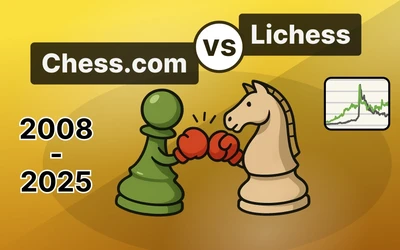
How to Spot a Cheater Before Your Game Even Starts
The strategies I'm about to share could save you a lot of rating if you cancel the games with cheaters effectively before they startLet’s be real. There are few things more tilting than playing your heart out, thinking you’re up against a genius... only to find out it was Stockfish doing the work. And while most cheaters eventually get banned, your rating and your nerves aren’t refunded.
But what if you could spot cheaters before you even play them? What if you could just click “cancel” before move 1 and move on to an honest game?
Here’s a practical guide to spotting cheaters from a mile away before the clock even starts ticking, which could potentially save you a ton of rating.
1. Profile-Based Cues
Brand-New Accounts at High Ratings
If you see an account created in the last week that’s already 2400+, it doesn’t guarantee they’re cheating, but it’s statistically suspicious. Most legitimate titled or strong players will have accounts that are months or years old.
Weird Nicknames
Of course, many usernames are random or goofy. But if you see things like:
- Hikaru_12345
- StockfishLevel8xD
- A jumble of random letters/numbers with no meaning
...it’s worth a second look. Some cheaters cycle through throwaway usernames with no attachment to reputation.
No Profile Info or It's Very Vague and Weird
While not definitive, cheaters often won’t bother adding a profile picture (although this mostly applies to chess.com as there are no profile pics on lichess) or filling in their bio. They don’t plan to keep the account for long.
2. Rating Graph Red Flags
Click on their profile and check their rating graph.
Skyrocketing Ratings
If it looks like a rocket launch – e.g. 1200 2200 in two days – that’s highly suspicious. Even strong improving players don’t climb hundreds of points per day without losses.
Suspicious Stability
If you see 50 games in a row all won with no rating dip, it’s either a massive smurf or a cheater. Either way, your rating is safer avoiding them.
3. Game History Patterns
If you have a moment before your game starts, quickly scan their recent games:
Extremely Short Games
If they’ve been crushing similar-rated players in 10-20 moves, it can suggest engine use, especially in balanced openings.
Consistent Crushing of Strong Opponents
If they’re a 1900 beating 2200s like it’s nothing, be wary.
4. Behavioural / Practical Tips
Some cues only appear during the game, but you can still spot them from move 1:
Playing Instantly in Complex Positions
If you notice them making the first 10 moves in 0.1 seconds each in offbeat openings, it’s a potential flag.
Wide Opening Repertoire
Cheaters often play random openings because engines don’t care about prep. If your opponent plays the Budapest, then the Scandinavian, then the Modern, then the Pirc, all with equal confidence, it’s worth being cautious.
5. A Word of Caution
Nothing here is 100% cheater-proof. False positives happen. Some new accounts are smurfs or second accounts of honest players. Some rapid rating jumps are due to returning strong players from old accounts. Always balance suspicion with fairness.
But from my own experience, cancelling against suspicious profiles has saved me dozens of tilting games and hundreds of rating points. Until cheaters are wiped out entirely (if that ever happens), keeping your cheater radar on is just practical strategy.
Final Takeaway
Cheaters can appear at any rating level, from sub-1000 to 3000+. Learning to detect them early is as much a part of your rating security as studying openings or endgames.
Next time you see that brand new 2500 rated account with zero losses and a random name like KJH23FFJ, think twice before pressing “play”. Your rating – and sanity – will thank you.
Have you spotted cheaters before move 1? I’d love to hear your stories or detection tricks. You can share them in the forum comments linked below – let’s build a safer and cleaner Lichess community together.
You may also like
 doughnut42
doughnut42How to Beat Opponents Who Play Extremely Fast and Random Moves: Full Guide
Many blitz players freak out and lose to opponents who play instantly and randomly. Here’s how to pu… doughnut42
doughnut42Why Your Brain Panics When You’re Winning
Pay attention as this might just be the hidden sabotage mechanisms of how your mind works CM HGabor
CM HGaborHow titled players lie to you
This post is a word of warning for the average club player. As the chess world is becoming increasin… doughnut42
doughnut42How Our Primate Brain Sabotages Winning Positions
Follow very closely as this could well be a reason you struggle to improve in chess. It's not about … doughnut42
doughnut42How to Know When to Pause and Think in Blitz
If you struggle do understand when to trust your instincts and play fast in blitz, and when to take … ChessMonitor_Stats
ChessMonitor_Stats